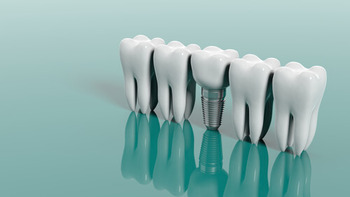Navigating the cost of dental implants in Australia can be daunting for those looking to enhance their smile. Dental implants, designed as replacement teeth anchored securely to the jaw bone, have emerged as a favoured dental treatment over traditional dental bridges or dentures. The investment is often considered worthwhile, given they closely mimic natural teeth in function and appearance, whether it’s a single dental implant or full mouth dental implant. However, factors such as bone grafting, the dental implant procedure, or the specific dental implant material used can influence dental implant costs. As with all dental procedures, weighing the benefits against the costs is essential, considering long-term oral health benefits and the potential need for further dental treatments.
What Are Dental Implants?
Dental implants have revolutionised oral health, offering a sturdy solution for missing or damaged teeth. So, what are dental implants? Dental implants are artificial tooth roots, usually crafted from titanium, placed into the jaw bone to support a dental crown or bridge. Their purpose is to emulate the function and appearance of natural teeth. The dental implant procedure involves implant placement, sometimes followed by bone grafting if there’s bone loss in the jaw. With dental implants, individuals can regain the confidence of a full smile and the functionality of natural teeth. Though the cost of dental implants in Australia can vary, considering their longevity and enhanced quality of life, many find them a worthy dental treatment.
Benefits of Dental Implants
Dental treatments have significantly evolved, with dental implants emerging as a pinnacle solution for missing or damaged teeth. While the cost of dental implants in Australia might initially seem high, the myriad of benefits they offer showcases their value as a worthy investment in one’s oral health.
One of the most renowned advantages of dental implants is their longevity and durability. Made typically from high-quality titanium, these implants are designed to last many years, even a lifetime, with proper care. Dental implants stand the test of time, unlike dental bridges that require replacement every 5-10 years. This long-lasting solution ensures that individuals won’t frequently revisit the dentist for implant-related complications, indirectly regulating dental implant costs in the long run.
Aesthetically, dental implants take the win. These implants seamlessly blend with the natural teeth, offering a flawless look that boosts confidence and restores smiles. Dental professionals invest considerable expertise in ensuring that the dental implant placement gives the appearance of a natural tooth, making it virtually impossible to distinguish between the implant and the real teeth surrounding it.
Moreover, dental implants play a crucial role in preventing bone loss. When teeth are missing, the jaw bone lacks the stimulation it requires to maintain density. This can lead to bone loss over time. Dental implants, anchored in the jaw bone, provide the necessary stimulation, halting the bone loss process. In cases where significant bone loss has already occurred, dental procedures such as bone grafting might be recommended before the dental implant surgery.
In terms of convenience and comfort, dental implants are unparalleled. Unlike dentures that can sometimes be ill-fitting or uncomfortable, dental implants function like natural teeth. Removing them nightly or using special adhesives to keep them in place is no hassle. Individuals can eat, speak, and live without impediments, knowing their implants are secure.
Factors Influencing the Cost of Dental Implants
Dental implants have redefined the standards of oral health solutions, particularly in tooth replacement. However, the cost of dental implants in Australia and elsewhere can vary significantly based on various factors.
The Type of Dental Implant

Dental implants cater to different needs. While some individuals might need a single dental implant to replace a missing tooth, others might look at full-mouth dental implants to restore their entire teeth. The spectrum ranges from single-tooth implants to implants for multiple teeth and even full arches. Full-mouth dental implants will cost considerably more than a single implant.
Materials Used for the Implant and Crown
Dental implant materials can influence the overall dental implant cost. Titanium is a common material for the implant itself due to its biocompatibility. The crowns could be made of porcelain, zirconia, or other materials, with varying prices depending on the choice.
Complexity of the Procedure
Not all dental implant procedures are straightforward. In cases where the jaw bone has receded, bone grafting might be required to ensure enough bone to support the implant. Similarly, procedures like sinus lifts can add to the complexity and, thus, the cost.
Geographic Location and Clinic Reputation
The cost of dental treatments often reflects the region’s living standards. For instance, dental implant costs in urban centres with a higher cost of living might be more than in rural areas. A dental practice’s reputation and equipment standards can also influence the price.
Experience and Expertise of the Dentist
A seasoned dentist with a track record of successful dental implant placements might charge more than a novice. The expertise ensures fewer complications and a higher success rate.
Additional Diagnostic Procedures
Before undergoing dental implant surgery, certain diagnostic tests, like X-rays or CT scans, might be needed to get a comprehensive view of the oral structure. These diagnostics add to the overall dental implant procedure cost.
Average Costs in Australia
Understanding the cost is paramount for those considering dental implants to address missing or damaged teeth. Dental implants in Australia come with various price tags, influenced by numerous factors. Here’s a comprehensive breakdown:
Initial Consultation
Before commencing any dental treatment, a preliminary consultation is essential. This consultation assesses the viability of dental implants for the patient and provides a detailed treatment plan. The average cost for this initial meeting with a dentist varies but typically is around AUD 100.
Pre-procedure Diagnostics
Detailed imaging and diagnostics are crucial to ensure the best outcomes for dental implant placement. These can range from X-rays to CT scans, allowing precise dental implant procedures. Such diagnostics usually cost around AUD 100, depending on the complexity.
The Implant Itself
The dental implant cost is often the most substantial single expense in the procedure. Depending on the dental implant material and brand, the cost of dental implants for a single tooth implant might be around AUD 2,000.
Crown or Prosthetic
After the dental implant integrates with the jaw bone, it’s crowned with a prosthetic to resemble natural teeth. Depending on the choice (ceramic, porcelain, etc.), the crown or prosthetic can cost around AUD 1,000.
Aftercare and Follow-ups
Ensuring the success and longevity of dental implants involves periodic check-ups. Over the year following the dental implant surgery, follow-ups might be around AUD 100.
Potential Additional Procedures
Some patients may need additional treatments, such as bone grafting for those with significant bone loss or sinus lifts for upper jaw implants. Bone grafting might add an extra AUD 500 to the dental implant cost.
Cost Comparison: Australia vs. Other Countries
The journey to replace missing or damaged teeth with dental implants has led many to explore cost-effective options across the globe. Let’s compare dental implant costs between Australia and some popular destinations: India, Bali, and Thailand.
India
The country has rapidly emerged as a sought-after destination for dental treatments. With the cost of dental implants here ranging between AUD 600-1,500 for a single dental implant, the price is considerably lower than in Australia.
Bali
Known for its beautiful beaches, Bali is also becoming popular for dental tourism. Dental implants in this Indonesian paradise can cost anywhere from AUD 800, making it an attractive option for those seeking an affordable dental procedure combined with a holiday.
Thailand
Renowned for its medical tourism, Thailand boasts advanced dental practices, offering dental implant treatments. A single tooth implant in Thailand might set you back by AUD 900-2,000.
Why Australia is Better
While the allure of reduced dental implant costs overseas is undeniable, Australia has distinct advantages. The cost of dental implants in Australia, though higher, ensures adherence to the highest standards. With rigorous regulations and best practices, the quality of dental implant procedures in Australia is unparalleled. Furthermore, the ease of follow-up, recourse in case of complications, and assurance of using top-notch dental implant material make Australia a preferred choice for many. Dental insurance also often covers major dental treatments in Australia, providing a financial cushion. Moreover, there’s the peace of mind knowing you’re close to home without the added stress of navigating post-treatment care in a foreign land.
Health Insurance and Dental Implants
The realm of dental care has witnessed revolutionary advancements, with dental implants leading the charge in replacing missing or damaged teeth. These implants have proven an effective solution for many, but the question often arises: does Australian health insurance cover the cost?
Does Australian Health Insurance Cover Dental Implants?
The direct answer is that it varies. Not all Australian dental insurance policies cover the cost of dental implants in Australia. While some comprehensive policies offer partial coverage for dental implant procedures, others might not. It’s pivotal to thoroughly check and understand the specifics of your dental health insurance benefits.
Tips on Finding and Understanding Insurance Policies That Offer Coverage:
Research Extensively
Begin by researching private health insurance companies that have dental coverage. Some may cover major dental treatments, including dental implants.
Check for Waiting Periods
Even if dental implants are covered, there might be a waiting period before you can claim.
Look at Coverage Limitations
Understand the limitations. Some policies cover dental implant surgery but may not cover additional procedures like bone grafting or sinus lifts.
Consult the National Dental Fee Survey
This can give you an idea of the average dental implant costs, helping you assess how much your insurance might cover versus potential out-of-pocket expenses.
Potential Out-Of-Pocket Expenses
While dental insurance might cover some dental implant treatments, several factors affect the final out-of-pocket cost. These might include:
- The complexity of the dental procedure.
- The need for additional treatments like bone grafting.
- The type of dental implant material used.
- The dental practice’s pricing. Given these variables, getting a clear estimate from your dental practitioner beforehand is prudent and comparing it against your insurance coverage to gauge potential out-of-pocket costs.
Payment Plans and Financing Options
The importance of oral health cannot be overstated. However, with the cost of dental implants in Australia and other dental treatments continually increasing, it’s becoming increasingly challenging for many Australians to afford the necessary procedures outright. Dental clinics and financial institutions offer various payment plans and financing options to bridge this financial gap.
Dental Clinics Offering Payment Plans

Many dental clinics understand the hefty dental implant costs and other associated expenses of procedures such as bone grafting, sinus lifts, or even full-mouth dental implants. To make these treatments accessible, many have introduced in-house payment plans. These plans often allow patients to spread the cost of their dental procedure over several months, making treatments like single dental implant placement or more extensive dental implant treatments more financially manageable.
Third-Party Financing Options Available for Dental Procedures
Besides in-house offerings, there are third-party financing options. These entities collaborate with dental practices, allowing patients to pay for their dental procedures over time. Whether for a single tooth implant, dental bridges, or more complex dental implant procedures, these financing options can reduce the upfront financial burden.
The Pros and Cons of Different Financing Methods:
In-house Payment Plans:
- Pros: Often interest-free if paid within a specific period; direct understanding between patient and dental practice.
- Cons: Limited repayment duration; might require a significant down payment.
Third-party Financing:
- Pros: Extended repayment periods; can be used across multiple dental practices; larger loan amounts.
- Cons: Interest rates can be high if not paid promptly; requires credit checks, which might affect credit scores.
While the National Dental Fee Survey can give a broad idea about dental treatments’ prices, individual dental implant costs or other procedure costs can vary depending on factors like the dental implant material used or the specific dental practice. Thus, payment plans or financing options can make even high-cost dental procedures more attainable.
Tips to Save on Dental Implant Costs
Dental implants have revolutionised the approach to missing or damaged teeth, offering a permanent solution that feels and functions like natural teeth. However, the cost of dental implants in Australia, as in many parts of the world, can be significant. Here are some tips to help you save on those costs without compromising the quality of care:
Early and Regular Dental Check-Ups To Prevent Major Dental Issues
Prevention is always better than cure, especially in oral health. Regular check-ups can detect issues like gum disease, tooth decay, or bone loss in their early stages. Addressing these problems promptly can prevent the need for more complicated dental problems and procedures, reducing the potential cost of dental treatments.
Researching and Comparing Prices Across Multiple Clinics
Prices for dental implant procedures and other dental treatments can vary considerably from one dental practice to another. Utilising tools like the National Dental Fee Survey or simply asking for quotes can give you a clearer picture of the dental implant costs in your area. Don’t hesitate to shop around and compare.
Taking Advantage of Promotional Offers or Discounts
Occasionally, dental practices offer promotional rates for procedures like single dental implant placements or even full-mouth dental implants. Staying informed and grabbing these opportunities can significantly reduce the dental implant cost.
Considering the Long-Term Benefits and Potential Cost Savings of Implants Compared To Other Dental Solutions

While dental implants might seem more expensive upfront than solutions like dental bridges or dentures, their longevity and reduced need for future dental procedures make them cost-effective in the long run. Implants can last a lifetime with proper care, eliminating the recurrent costs associated with other tooth replacement options.
Conclusion
Navigating the myriad of options available in dental treatments can indeed be overwhelming. However, the importance of making an informed decision must be addressed. Dental procedures, while crucial for maintaining oral health and overall well-being, can have lasting medical and financial implications. Therefore, it’s pivotal to approach them with a well-researched and holistic perspective.
Despite their upfront costs, dental implants present a perfect case of an investment that pays off in the long run. They’re not just a temporary solution but a life-long asset to your oral health. They don’t merely fill a gap; they restore the function, aesthetics, and confidence that might have been lost with missing or damaged teeth. Compared to other dental solutions that might require frequent adjustments, replacements, or additional treatments, dental implants offer remarkable long-term value with their longevity and minimal maintenance.
It’s crucial to view dental implants not as an expense but as an investment in your health, confidence, and quality of life. For a comprehensive understanding and to embark on your journey towards a healthier smile, consider visiting Beyond Infinity Dental. Call them on (02) 8806 3799. Their expertise and patient-centric approach ensure you receive the best care tailored to your needs.
Note: Any surgical or invasive procedure carries risks. Before proceeding, you should seek a second opinion from an appropriately qualified health practitioner.
References:
https://pubmed.ncbi.nlm.nih.gov/8699485/
https://www.dentalhealth.org/Blog/dental-implants-and-how-crucial-replacing-teeth-really-is
www.verywellhealth.com/what-to-expect-during-a-dental-implant-procedure-1059372
http://www.healthline.com/health/dental-and-oral-health/dental-implant-procedure#seeing-a-dentist









